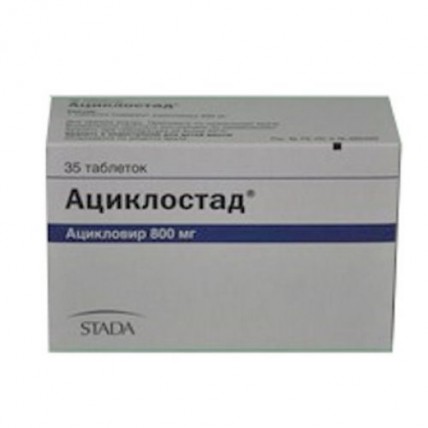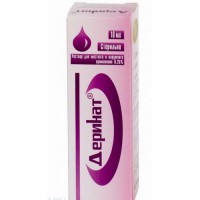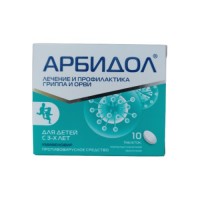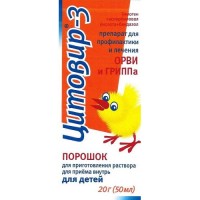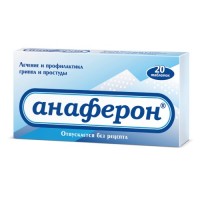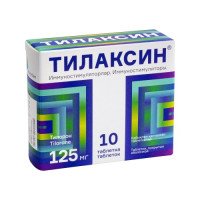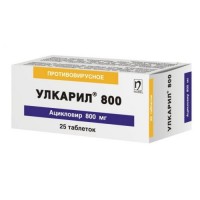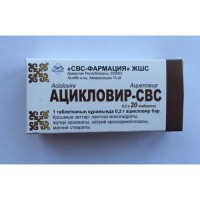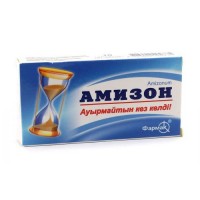Aciclostad 800 mg (35 tablets)
- $58.00
The instruction for use
of medicine for experts
Aciclostad
Acyclostad
Trade name
Aciclostad
of Acyclostad
the International unlicensed
name Acyclovir Dosage Form
of the Tablet of 200 mg, 400 mg and 800 mg
Structure
One tablet contains
active agent acyclovir of 200 mg, 400 mg and 800 mg,
excipients: microcrystalline cellulose, kopolividon, weed (O-carboxymethyl) starch-sodium, magnesium stearate, high-disperse silicon dioxide.
Description
Aciclostad, 200 mg of a tablet: tablets of white color, round, biconvex, with VS1 engraving.
Aciclostad, 400 mg of a tablet: tablets of white color, round, biconvex, with VS2 engraving.
Aciclostad, 800 mg of a tablet: tablets of white color, oblong, with a notch and an engraving of VS3.
Pharmacotherapeutic group
Antiviral drugs for system use of direct action, nucleosides and nucleotides.
The code of automatic telephone exchange J05AB01
the Pharmacological
Pharmacokinetics Acyclovir properties rezorbirutsya from digestive tract only partially. Average peak concentration in plasma after repeated oral introduction of 200 mg, 400 mg and 800 mg of acyclovir of 5 times during the day make each 4 hours 3.02 & plusmn, 0.5 µmol/l (200 mg), 5.21 & plusmn, 1.32 µmol/l (400 mg) or 8.16 & plusmn, 1.98 µmol/l (800 mg). These values are reached approximately through 1.5 & plusmn, 0.6 hours. Concentration of acyclovir in blood plasma in 4 hours after the single oral use of acyclovir make 1.61 & plusmn, 0.3 µmol/l (200 mg), 2.59 & plusmn, 0.53 µmol/l (400 mg) or 4.0 & plusmn, 0.72 µmol/l (800 mg). In 24 hours after the termination of intake of acyclovir, drug is completely removed from an organism.
At children with immunosuppression aged from 3 up to 11 years after oral administration of 400 mg of acyclovir, i.e. 300-650 mg of acyclovir/sq.m of a body surface, 5 times during the day, average peak concentration in blood plasma make 5.7 - 15.1 µmol/l. At babies aged from 1 up to 6 weeks after oral introduction of 600 mg of acyclovir/sq.m of a body surface each 6 hours peak concentration in blood plasma made 17.3 or 8.6 µmol/l.
Acyclovir in high concentrations gets into fabrics and bodies and is slowly removed from them.
The volume of distribution is 50 & plusmn, 8.7 l / 1.73 sq.m at adults and 28.8 & plusmn, 9.3 l / 1.73 sq.m at newborns and babies up to 3 months. Linking with proteins of blood plasma was in range between 9 and 33%.
Distribution
the highest concentrations of acyclovir are reached in intestines, kidneys, a liver and lungs, and lower - in muscles, heart, a brain, ovaries and seed plants of animals.
Acyclovir collects in saliva, a vaginal secret, vesicular liquid of herpetic bubbles and also in some bodies. Concentration of drug in cerebrospinal fluid equals 50% of concentration in serum.
Metabolism and elimination
At patients with normal function of kidneys of 62-91% of acyclovir are removed through kidneys in not changed look, and 10-15% in a look 9-carboxy-metoksimetilguanina. Removal of acyclovir is carried out both by glomerular filtration, and by canalicular secretion.
At patients with chronic kidney disease the average half-life period is about 19.5 hours. The average half-life period during a hemodialysis is 5.7 hours. During a hemodialysis the acyclovir level in plasma falls approximately for 60%. At bounded function of kidneys and clearance of creatinine of 10 ml/min. / 1.73 the sq.m exists danger of cumulation at a dosage on 200 mg of 5 times a day. Therefore at the above-stated clearance of creatinine the drug dose decline is shown (see also section Route of administration and doses).
The pharmacodynamics
Acyclovir is pharmacological inactive substance which is transformed to antiviral means only after penetration into the cell infected with viruses of a herpes simplex (HSV) or the varicella-zoster (VZV) viruses. After system use this activation of acyclovir is exposed to catalytic action from a thymidinekinase of the HSV or VZV viruses, enzyme which is necessary for replication of these viruses. In the simplified look it is possible to tell that the virus synthesizes own antiviral means. At the same time this process goes through the following stages:
1. after system use, acyclovir gets in a strengthened way into the cells infected with herpes,
2. the virus thymidinekinase which is in these cells phosphorylates acyclovir in acyclovir monophosphate,
3. cellular enzymes turn acyclovir monophosphate into own antiviral means, acyclovir triphosphate,
4. acyclovir triphosphate selectively blocks synthesis of virus DNA,
5. the virus DNA polymerase includes acyclovir in virus DNA therefore there is a break of a chain at DNA synthesis.
These separate stages lead to suppression of replication of a virus.
Spectrum of action
Highly sensitive viruses: a herpes simplex virus like I and II, the varicella-zoster virus.
Sensitive viruses: Epstein-Burra's virus.
Insensitive to resistant: cytomegalovirus.
Resistant viruses: RNA viruses, adenoviruses, poksvirusa.
Indications
Aciclostad, 200 mg of a tablet
- the infections caused by a herpes simplex virus, in particular, herpes of skin and mucous membrane of genitalias (primary and often recurrent herpes of genitalias)
- preventive treatment of the adult patients suffering from very severe forms of often recurrent infections of the genitalias caused (Negres of genitalis).
Aciclostad, 400 mg of a tablet
- Herpes Zoster (shingles)
- prevention of the heavy infections caused by a herpes simplex virus at adult patients with a pronounced immunosuppresiya at the increased risk of infection, for example, after organ transplantation.
Aciclostad, 800 mg of a tablet
- Herpes Zoster (shingles).
A route of administration and doses
For adults
In the infections caused by a herpes simplex virus
to accept the Single dose of 200 mg of an Aciclostad 5 times during the day each 4 hours.
For prevention of severe forms and often recurrent infections of the genitalias caused by a herpes simplex virus:
Immunological healthy patients accept a single dose of 200 mg of an Aciclostad 4 times in every day of 6 hours. As an alternative it is also possible to accept daily 400 mg of an Aciclostad each 12 hours. In some cases effective prevention can be reached at a dosage on 200 mg of an Aciclostad 3 times in every day of 8 hours or on 200 mg of an Aciclostad 2 times in every day of 12 hours. If, despite the general daily dose of 800 mg the recurrence (resuming of an infection) takes place, then it is necessary to accept 200 mg of an Aciclostad of 5 times within a day each 4 hours for 5 days. After that accept the above-stated preventive doses again.
To patients with immunosuppression appoint for prevention a single dose of 200 mg of an Aciclostad 4 times in every day of 6 hours.
To patients with pronounced immunosuppression, for example, after organ transplantation, it is possible to appoint 400 mg of an Aciclostad 4 times in every day of 6 hours. As an alternative, at patients with the broken resorption in intestines, it is possible to use acyclovir in the form of dry matter for intravenous injections.
Duration of preventive use depends on extent of easing of immunity.
For children
For treatment of the infections caused by a herpes simplex virus, to children 2 years are more senior give an adult dose, aged up to 2 years - a half of an adult dose.
The instruction
At patients with immunosuppression cases of possible development of resistance were described. It should be considered at a dosage.
In shingles (Herpes zoster)
to accept the Single dose of 800 mg of an Aciclostad 5 times within a day each 4 hours. Duration of treatment is 5-7 days.
The following doses
the Indication
Clearance of creatinine
creatinine Level in serum (µmol/l or mg/dl)
the Dose
(ml/min. / 1.73 sq.m)
the Woman Muzhchina Infektion caused by a virus of a herpes simplex
& lt, 10
& gt, 550/
& gt, 6.22
& gt, 750/
& gt,
8.48,200 mg of Aciclostad 2 times a day each 12 hours
Shingles
of 25-10 280-550/3.17-6.22 370-750/4.18-8.48,800 mg of Aciclostad 3 times a day each 8 hours
Shingles
& lt, 10
& gt, 550/
& gt, 6.22
& gt, 750/
& gt,
8.48,800 mg of Aciclostad 2 times a day each 12 hours are recommended to patients with impaired renal function.
The route of administration
of the Tablet should be accepted in not chewed look, it is desirable after a meal, with enough liquid (for example, 1 glass of water). At impaired renal function it is necessary to monitor sufficient intake of liquid in an organism during treatment.
The instruction Aciclostad, tablets should begin to be accepted as soon as possible after emergence of the first symptoms of an infection.
Side effects
- skin rash
- nausea, vomiting, diarrhea and an abdominal pain
- dizziness, headaches, confusion of consciousness, prostration, hallucinations, drowsiness or insomnia, fatigue
- a depersonalization syndrome
- temporary convulsive attacks and psychoses
- the taking place increase in level of bilirubin, enzymes of a liver, urea in serum and creatinine and also insignificant decrease in hematologic parameters
- breath difficulty
- a diffusion alopecia.
Contraindications
- hypersensitivity to acyclovir and other components of drug
- preventive use of drug for patients with impaired renal function or an anury
- the lactation period.
Medicinal interactions
Probenetsid reduces removal of an Aciclostad kidneys approximately by 30% that can lead to increase in its average elimination half-life.
The special
instructions Pregnancy and a lactation
If during pregnancy the therapy by Aciclostad is required, then it is necessary to compare carefully possible advantage and potential risk.
Features of influence of medicine on ability to run the vehicle or potentially dangerous mechanisms
Considering side effects of drug it is necessary to be careful at control of motor transport or the mechanisms demanding concentration of attention.
Overdose
So far at the single oral use of a dose up to 5 g no symptoms of poisoning were observed. About the single oral use of higher doses there are no data. Therefore at the use of an Aciclostad in doses over 5 g it is necessary to carry out careful control of a condition of the patient through short periods. Symptomatic treatment.
Aciclostad is brought at a hemodialysis.
A form of release and packing
Aciclostad, tablets of 200 mg, on 5 tablets in the blister, 5 or 20 blisters in a cardboard pack, with the enclosed instruction for use.
Aciclostad, tablets of 400 mg or 800 mg, on 5 tablets in the blister, 7 blisters in a cardboard pack, with the enclosed instruction for use.
To Store storage conditions at a temperature not over 25C.
To store out of children's reach!
An expiration date
Aciclostad, tablets of 200 mg and 800 mg - 5 years.
Aciclostad, tablets of 400 mg - 4 years.
Not to apply after an expiration date.
Prescription status
According to the prescription
Stadastrasse
2 - 18
Proizvoditel ShTADA Artsnaymittel AG
of D-61118 Bud Vilbel, Germany
phone number: + 49 6101 603-0
the telefax: + 49 6101 603-259
web website:
To develop http://www.stada.de
of medicine for experts
Aciclostad
Acyclostad
Trade name
Aciclostad
of Acyclostad
the International unlicensed
name Acyclovir Dosage Form
of the Tablet of 200 mg, 400 mg and 800 mg
Structure
One tablet contains
active agent acyclovir of 200 mg, 400 mg and 800 mg,
excipients: microcrystalline cellulose, kopolividon, weed (O-carboxymethyl) starch-sodium, magnesium stearate, high-disperse silicon dioxide.
Description
Aciclostad, 200 mg of a tablet: tablets of white color, round, biconvex, with VS1 engraving.
Aciclostad, 400 mg of a tablet: tablets of white color, round, biconvex, with VS2 engraving.
Aciclostad, 800 mg of a tablet: tablets of white color, oblong, with a notch and an engraving of VS3.
Pharmacotherapeutic group
Antiviral drugs for system use of direct action, nucleosides and nucleotides.
The code of automatic telephone exchange J05AB01
the Pharmacological
Pharmacokinetics Acyclovir properties rezorbirutsya from digestive tract only partially. Average peak concentration in plasma after repeated oral introduction of 200 mg, 400 mg and 800 mg of acyclovir of 5 times during the day make each 4 hours 3.02 & plusmn, 0.5 µmol/l (200 mg), 5.21 & plusmn, 1.32 µmol/l (400 mg) or 8.16 & plusmn, 1.98 µmol/l (800 mg). These values are reached approximately through 1.5 & plusmn, 0.6 hours. Concentration of acyclovir in blood plasma in 4 hours after the single oral use of acyclovir make 1.61 & plusmn, 0.3 µmol/l (200 mg), 2.59 & plusmn, 0.53 µmol/l (400 mg) or 4.0 & plusmn, 0.72 µmol/l (800 mg). In 24 hours after the termination of intake of acyclovir, drug is completely removed from an organism.
At children with immunosuppression aged from 3 up to 11 years after oral administration of 400 mg of acyclovir, i.e. 300-650 mg of acyclovir/sq.m of a body surface, 5 times during the day, average peak concentration in blood plasma make 5.7 - 15.1 µmol/l. At babies aged from 1 up to 6 weeks after oral introduction of 600 mg of acyclovir/sq.m of a body surface each 6 hours peak concentration in blood plasma made 17.3 or 8.6 µmol/l.
Acyclovir in high concentrations gets into fabrics and bodies and is slowly removed from them.
The volume of distribution is 50 & plusmn, 8.7 l / 1.73 sq.m at adults and 28.8 & plusmn, 9.3 l / 1.73 sq.m at newborns and babies up to 3 months. Linking with proteins of blood plasma was in range between 9 and 33%.
Distribution
the highest concentrations of acyclovir are reached in intestines, kidneys, a liver and lungs, and lower - in muscles, heart, a brain, ovaries and seed plants of animals.
Acyclovir collects in saliva, a vaginal secret, vesicular liquid of herpetic bubbles and also in some bodies. Concentration of drug in cerebrospinal fluid equals 50% of concentration in serum.
Metabolism and elimination
At patients with normal function of kidneys of 62-91% of acyclovir are removed through kidneys in not changed look, and 10-15% in a look 9-carboxy-metoksimetilguanina. Removal of acyclovir is carried out both by glomerular filtration, and by canalicular secretion.
At patients with chronic kidney disease the average half-life period is about 19.5 hours. The average half-life period during a hemodialysis is 5.7 hours. During a hemodialysis the acyclovir level in plasma falls approximately for 60%. At bounded function of kidneys and clearance of creatinine of 10 ml/min. / 1.73 the sq.m exists danger of cumulation at a dosage on 200 mg of 5 times a day. Therefore at the above-stated clearance of creatinine the drug dose decline is shown (see also section Route of administration and doses).
The pharmacodynamics
Acyclovir is pharmacological inactive substance which is transformed to antiviral means only after penetration into the cell infected with viruses of a herpes simplex (HSV) or the varicella-zoster (VZV) viruses. After system use this activation of acyclovir is exposed to catalytic action from a thymidinekinase of the HSV or VZV viruses, enzyme which is necessary for replication of these viruses. In the simplified look it is possible to tell that the virus synthesizes own antiviral means. At the same time this process goes through the following stages:
1. after system use, acyclovir gets in a strengthened way into the cells infected with herpes,
2. the virus thymidinekinase which is in these cells phosphorylates acyclovir in acyclovir monophosphate,
3. cellular enzymes turn acyclovir monophosphate into own antiviral means, acyclovir triphosphate,
4. acyclovir triphosphate selectively blocks synthesis of virus DNA,
5. the virus DNA polymerase includes acyclovir in virus DNA therefore there is a break of a chain at DNA synthesis.
These separate stages lead to suppression of replication of a virus.
Spectrum of action
Highly sensitive viruses: a herpes simplex virus like I and II, the varicella-zoster virus.
Sensitive viruses: Epstein-Burra's virus.
Insensitive to resistant: cytomegalovirus.
Resistant viruses: RNA viruses, adenoviruses, poksvirusa.
Indications
Aciclostad, 200 mg of a tablet
- the infections caused by a herpes simplex virus, in particular, herpes of skin and mucous membrane of genitalias (primary and often recurrent herpes of genitalias)
- preventive treatment of the adult patients suffering from very severe forms of often recurrent infections of the genitalias caused (Negres of genitalis).
Aciclostad, 400 mg of a tablet
- Herpes Zoster (shingles)
- prevention of the heavy infections caused by a herpes simplex virus at adult patients with a pronounced immunosuppresiya at the increased risk of infection, for example, after organ transplantation.
Aciclostad, 800 mg of a tablet
- Herpes Zoster (shingles).
A route of administration and doses
For adults
In the infections caused by a herpes simplex virus
to accept the Single dose of 200 mg of an Aciclostad 5 times during the day each 4 hours.
For prevention of severe forms and often recurrent infections of the genitalias caused by a herpes simplex virus:
Immunological healthy patients accept a single dose of 200 mg of an Aciclostad 4 times in every day of 6 hours. As an alternative it is also possible to accept daily 400 mg of an Aciclostad each 12 hours. In some cases effective prevention can be reached at a dosage on 200 mg of an Aciclostad 3 times in every day of 8 hours or on 200 mg of an Aciclostad 2 times in every day of 12 hours. If, despite the general daily dose of 800 mg the recurrence (resuming of an infection) takes place, then it is necessary to accept 200 mg of an Aciclostad of 5 times within a day each 4 hours for 5 days. After that accept the above-stated preventive doses again.
To patients with immunosuppression appoint for prevention a single dose of 200 mg of an Aciclostad 4 times in every day of 6 hours.
To patients with pronounced immunosuppression, for example, after organ transplantation, it is possible to appoint 400 mg of an Aciclostad 4 times in every day of 6 hours. As an alternative, at patients with the broken resorption in intestines, it is possible to use acyclovir in the form of dry matter for intravenous injections.
Duration of preventive use depends on extent of easing of immunity.
For children
For treatment of the infections caused by a herpes simplex virus, to children 2 years are more senior give an adult dose, aged up to 2 years - a half of an adult dose.
The instruction
At patients with immunosuppression cases of possible development of resistance were described. It should be considered at a dosage.
In shingles (Herpes zoster)
to accept the Single dose of 800 mg of an Aciclostad 5 times within a day each 4 hours. Duration of treatment is 5-7 days.
The following doses
the Indication
Clearance of creatinine
creatinine Level in serum (µmol/l or mg/dl)
the Dose
(ml/min. / 1.73 sq.m)
the Woman Muzhchina Infektion caused by a virus of a herpes simplex
& lt, 10
& gt, 550/
& gt, 6.22
& gt, 750/
& gt,
8.48,200 mg of Aciclostad 2 times a day each 12 hours
Shingles
of 25-10 280-550/3.17-6.22 370-750/4.18-8.48,800 mg of Aciclostad 3 times a day each 8 hours
Shingles
& lt, 10
& gt, 550/
& gt, 6.22
& gt, 750/
& gt,
8.48,800 mg of Aciclostad 2 times a day each 12 hours are recommended to patients with impaired renal function.
The route of administration
of the Tablet should be accepted in not chewed look, it is desirable after a meal, with enough liquid (for example, 1 glass of water). At impaired renal function it is necessary to monitor sufficient intake of liquid in an organism during treatment.
The instruction Aciclostad, tablets should begin to be accepted as soon as possible after emergence of the first symptoms of an infection.
Side effects
- skin rash
- nausea, vomiting, diarrhea and an abdominal pain
- dizziness, headaches, confusion of consciousness, prostration, hallucinations, drowsiness or insomnia, fatigue
- a depersonalization syndrome
- temporary convulsive attacks and psychoses
- the taking place increase in level of bilirubin, enzymes of a liver, urea in serum and creatinine and also insignificant decrease in hematologic parameters
- breath difficulty
- a diffusion alopecia.
Contraindications
- hypersensitivity to acyclovir and other components of drug
- preventive use of drug for patients with impaired renal function or an anury
- the lactation period.
Medicinal interactions
Probenetsid reduces removal of an Aciclostad kidneys approximately by 30% that can lead to increase in its average elimination half-life.
The special
instructions Pregnancy and a lactation
If during pregnancy the therapy by Aciclostad is required, then it is necessary to compare carefully possible advantage and potential risk.
Features of influence of medicine on ability to run the vehicle or potentially dangerous mechanisms
Considering side effects of drug it is necessary to be careful at control of motor transport or the mechanisms demanding concentration of attention.
Overdose
So far at the single oral use of a dose up to 5 g no symptoms of poisoning were observed. About the single oral use of higher doses there are no data. Therefore at the use of an Aciclostad in doses over 5 g it is necessary to carry out careful control of a condition of the patient through short periods. Symptomatic treatment.
Aciclostad is brought at a hemodialysis.
A form of release and packing
Aciclostad, tablets of 200 mg, on 5 tablets in the blister, 5 or 20 blisters in a cardboard pack, with the enclosed instruction for use.
Aciclostad, tablets of 400 mg or 800 mg, on 5 tablets in the blister, 7 blisters in a cardboard pack, with the enclosed instruction for use.
To Store storage conditions at a temperature not over 25C.
To store out of children's reach!
An expiration date
Aciclostad, tablets of 200 mg and 800 mg - 5 years.
Aciclostad, tablets of 400 mg - 4 years.
Not to apply after an expiration date.
Prescription status
According to the prescription
Stadastrasse
2 - 18
Proizvoditel ShTADA Artsnaymittel AG
of D-61118 Bud Vilbel, Germany
phone number: + 49 6101 603-0
the telefax: + 49 6101 603-259
web website:
To develop http://www.stada.de
